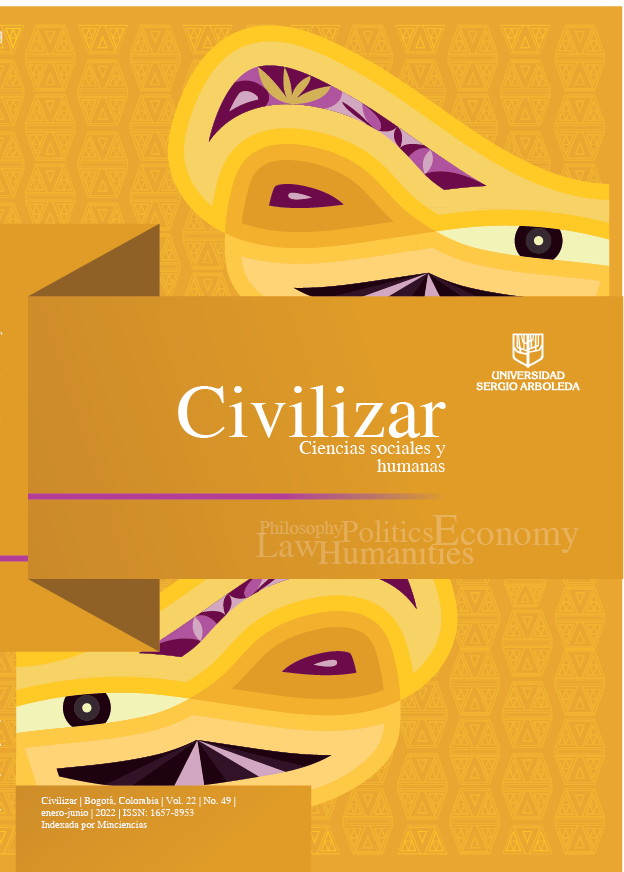Abstract
The purpose of this research was to analyze the relationship between supervision or monitoring, empathy, and aggressive behavior - verbal and physical - in-school adolescents in Bogotá. The study is a cross-sectional correlational descriptive type.
The sample consisted of 324 adolescents attending school in the city of Bogotá. 158 female adolescents (48.76%) and 166 males (51.24%), aged between 11 and 18 years.
The results showed that the disclosure or spontaneous communication of adolescent activities towards the mother is inversely related to aggressive behavior, specifically physical aggression in male adolescents. Likewise, it was found that empathy is the predictor variable with the greatest weight in the appearance of physical aggression in male adolescents; while the independent variables: father's open communication, father's parental control, and empathy manage to explain 24.6% of the variability of verbal aggression in female adolescents.
References
Betancourt, O. D y Andrade, P.P. (2011). Control parental y problemas emocionales y de conducta en adolescentes. Revista Colombiana de Psicología, 20(1), 27-41. https://www.redalyc.org/articulo.oa?id=80419035006
Bezanilla, J.M. y Miranda, M. A. (2013). La familia como grupo social: una reconceptualización. Alternativas en Psicología, 17(29), 58-73. http://pepsic.bvsalud.org/scielo.php?script=sci_arttext&pid=S1405-339X2013000200005&lng=pt&tlng=es.
Buss, A. H. y Perry, M. (1992). The aggression questionnaire. Journal of Personality and Social Psychology, 63(3), 452. https://doi.org/10.1037/0022-3514.63.3.452
Carrillo, L., Juárez, F., González, C., Martínez y Medina, M. (2016). Relación entre supervisión parental y conducta antisocial en menores infractores del Estado de Morelos. Salud Mental, 39(1), 11-17. https://doi.org/10.17711/SM.0185-3325.2015.063
Castrillón MD., Ortiz T. P. y Vieco GF. (2009). Cualidades paramétricas del cuestionario de agresión (AQ) de Buss y Perry en estudiantes universitarios de la ciudad de Medellín (Colombia). Revista Facultad Nacional De Salud Pública, 22(2). https://revistas.udea.edu.co/index.php/fnsp/article/view/561
Chaux, E., Castro, L., Daza, J., Díaz C. y Hurtado, N. (2004). Empatía: instrumento de autorreporte. Universidad de los Andes
Chaux, E., Bustamante, A., Castellanos, M., Jiménez, M., Nieto, A., Rodríguez, G., Blair, R., Molano, A., Ramos, C y Velásquez, A. (2008). Aulas en paz: estrategias pedagógicas. Revista Interamericana de Educación para la Democracia, 1(2). http://www.dhls.hegoa.ehu.eus/uploads/resources/4825/resource_files/Aulas_en_...pdf
Darling, N. (1999). Parenting style and its correlates. EEUU: ERIC Digest.
Darling, N. & Steinberg, L. (1993). Parenting style and context: An integrative model. Psychological Bulletin, 113 (3), 487-496. https://doi.org/10.1037/0033-2909.113.3.487
Del Barrio, C., Martín, E., Almeida, A. y Barrios, A. (2003). Del maltrato y otros conceptos relacionados con la agresión entre escolares, y su estudio psicológico. Infancia y Aprendizaje, 26, 1, 9-24. https://doi.org/10.1174/02103700360536400
Eisenberg, N. (2000). Emotion, regulation, and moral development. Annual Review of Psychology, 51(1), 665-697. https://doi.org/10.1146/annurev.psych.51.1.665
Guevara, I. P., Cabrera, V, E., González, M. R. y Devis, J. V. (2015). Empathy and sympathy as mediators between parental inductive discipline and prosocial behavior in Colombian families. International Journal of Psychological Research, 8(2), 34-48. https://doi.org/10.21500/20112084.1508
Guevara, I. P., Díaz, A. M., Mondragón, W. J., y Ramos, S. M. (2021). Relación entre las prácticas parentales y el comportamiento externalizante de los adolescentes. Civilizar: Ciencias Sociales y Humanas, 21(40), 73-82. https://doi.org/10.22518/jour.ccsh/2021.1a06
Hayes, L. Hudson, A y Mattews, J. (2004). Parental Monitoring Behaviors: A Model of Rules, Supervision, and Conflict. Behavior Therapy, 35(3), 587-604. https://doi.org/10.1016/S0005-7894(04)80033-9
Hernández, R., Fernández, C. y Baptista, M. (2014). Metodología de la investigación. Mc Graw Hill-Interamericana Editores.
Kapetanovic, S. Skoog, T. Bohlin, M. y Gerdner, A. (2019). Aspects of the Parent–Adolescent Relationship and Associations with Adolescent Risk Behaviors Over Time. Journal of Family Psychology, 33(1), 1-11. http://doi.org/10.1037/fam0000436.supp
Kaur, J., Chawla, A. y Vig, D. (2021). Association of aggression and family environment among rural and urban adolescents of Ludhiana district. Indian Journal of Health & Wellbeing, 12(1).
Kerr, M., Stattin, H. y Burk, W. J. (2010). A reinterpretation of parental monitoring in longitudinal perspective. Journal of Research on Adolescence, 20(1), 39-64. https://doi.org/10.1111/j.1532-7795.2009.00623.x
López, M. C., Sánchez, A., Rodríguez, L.T & Fernández, M.P. (2009). Propiedades psicométricas del Cuestionario AQ aplicado a población adolescente. EduPsykhé, 8(1). https://dialnet.unirioja.es/servlet/articulo?codigo=3040319.
Lemos, V. y Richaud, M. C. (2021). A New Multidimensional Questionnaire of Empathy for Early and Middle Adolescents in Spanish. International Journal of Psychological Research, 14(1), 91–105. https://doi.org/10.21500/20112084.5030
Méndez, M. P., Peñaloza, R., García, M., Jaenes, J. C. y Velázquez, H.R. (2019). Divergences in the perception of parental practices, positive behavior and problems between parents and children. Acta Colombiana de Psicología, 22(2), 206-217. http://www.doi.org/10.14718/ACP.2019.22.2.10
Morris, A. S., Silk, J. S., Steinberg, L., Myers, S. S. y Robinson, L. R. (2007). The role of the family context in the development of emotion regulation. Social Development, 16(2), 361-388. https://onlinelibrary.wiley.com/doi/abs/10.1111/j.1467-9507.2007.00389.x
Sánchez, C. (2012). Significado psicológico de familia, papá y mamá en adolescentes. Psicología Iberoamericana, 20(1), 18-28. https://doi.org/10.48102/pi.v20i1.216
Solberg, M. y Olweus, D. (2003). Prevalence estimation of school bullying with the Olweus Bully/Victim Questionnaire. Aggressive Behavior, 29. 239-268. https://doi.org/10.1002/ab.10047
Stattin, H. y Kerr, M. (2000). Parental monitoring: A reinterpretation. Child Development, 71(4), 1072-1085. https://doi.org/10.1111/1467-8624.00210
Tur-Porcar, A., Llorca, A., Malonda, E., Samper, P. y Mestre, M. V. (2016). Empatía en la adolescencia: relaciones con razonamiento moral prosocial, conducta prosocial y agresividad. Acción Psicológica, 13(2), 3-14. http://doi.org/10.5944/ap.13.2.17802

This work is licensed under a Creative Commons Attribution-NonCommercial-NoDerivatives 4.0 International License.
Copyright (c) 2022 Journal Civilizar: Social and Human Sciences


